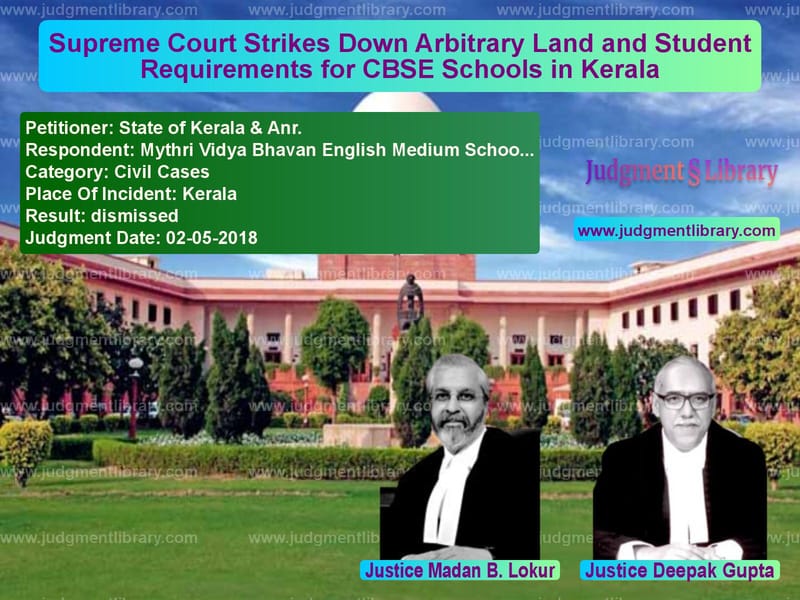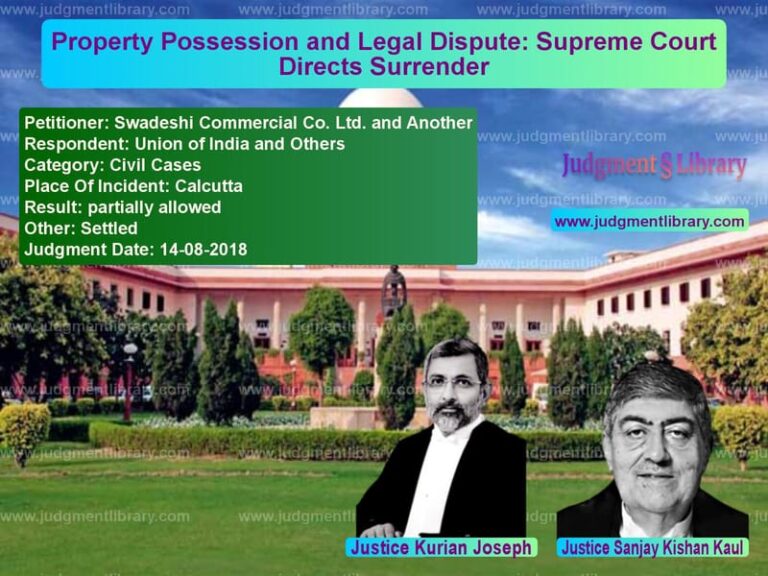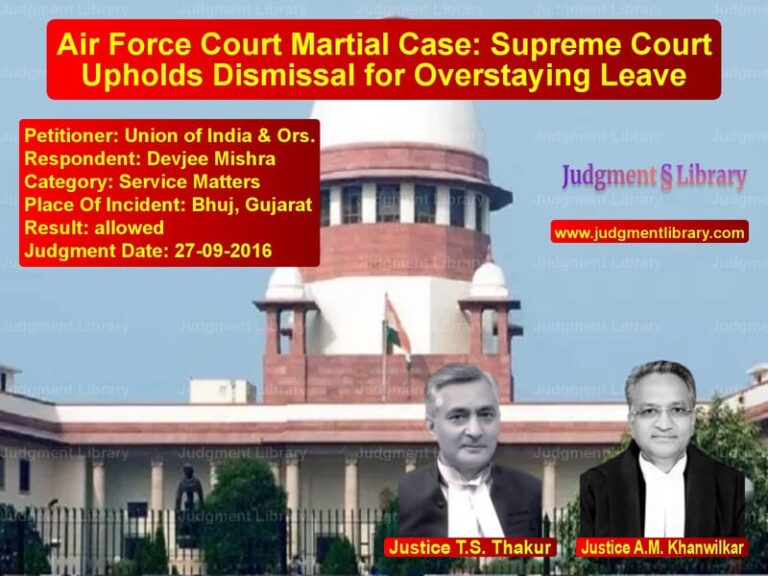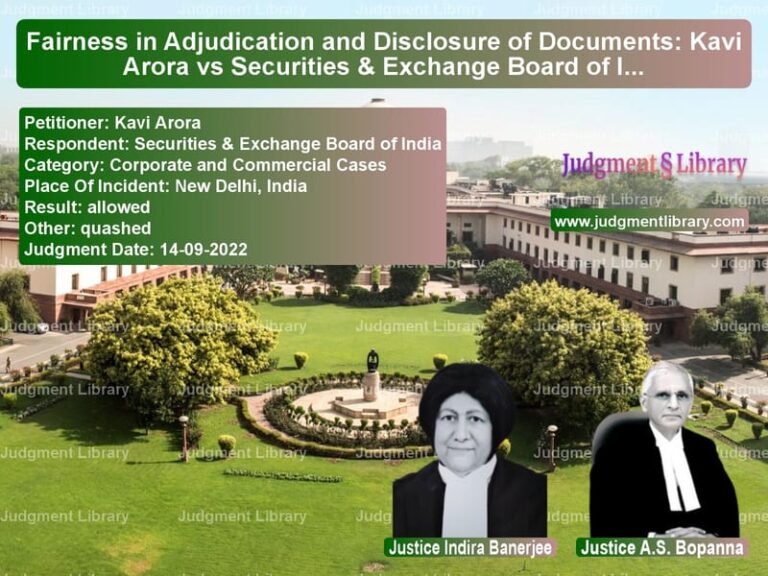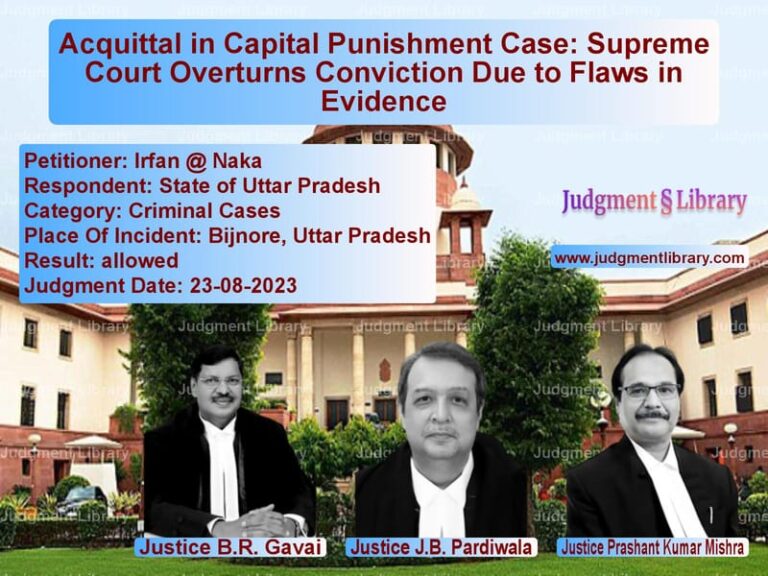Supreme Court Strikes Down Arbitrary Land and Student Requirements for CBSE Schools in Kerala
The case of State of Kerala & Anr. vs. Mythri Vidya Bhavan English Medium School & Ors. addresses the issue of arbitrary restrictions imposed by the Kerala Government on private schools seeking affiliation with the Central Board of Secondary Education (CBSE). The Supreme Court examined whether the state government’s conditions for granting No Objection Certificates (NOCs) for CBSE affiliation were legally valid and justified.
The Supreme Court ruled against the Kerala Government, striking down the requirement of a minimum of three acres of land and a minimum student strength of 300 students for obtaining an NOC. The Court held that these restrictions were arbitrary, lacked rational justification, and unfairly discriminated against private schools seeking CBSE affiliation.
Background of the Case
The case arose when the Kerala Government issued a policy restricting the grant of NOCs for CBSE-affiliated schools by imposing stringent land and student strength requirements. Several private schools challenged these conditions in the Kerala High Court, which ruled in their favor. The State of Kerala then appealed to the Supreme Court.
Key aspects of the case include:
- The Kerala Government issued guidelines requiring schools seeking CBSE affiliation to possess a minimum of three acres of land, with at least two acres at the actual location of the school.
- Another guideline mandated that schools have a minimum student enrollment of 300 before applying for CBSE affiliation.
- The schools argued that these conditions were arbitrary and designed to restrict private CBSE schools from competing with state-run schools.
- The Kerala High Court struck down these conditions as unconstitutional, leading the state to file an appeal before the Supreme Court.
Key Legal Issues Considered
The Supreme Court examined the following legal questions:
- Whether the requirement of a minimum of three acres of land for CBSE affiliation was legally justified.
- Whether the condition requiring a minimum student strength of 300 before applying for CBSE affiliation was rational and necessary.
- Whether the Kerala Government’s restrictions unfairly targeted private CBSE schools in favor of state-run institutions.
- Whether these conditions violated the Right to Education and the CBSE’s Affiliation Bye-laws.
Arguments of the Parties
Petitioner’s (State of Kerala) Arguments
The State of Kerala contended:
- The restrictions were necessary to regulate the growth of CBSE schools and prevent the commercialization of education.
- Schools with less than three acres of land may not provide adequate infrastructure and facilities for students.
- A minimum student strength of 300 was essential to ensure financial sustainability and prevent schools from charging exorbitant fees.
- The guidelines were framed in the interest of students and aligned with the Kerala Education Rules.
Respondent’s (Mythri Vidya Bhavan English Medium School & Others) Arguments
The schools challenging the guidelines argued:
- The Kerala Government’s restrictions were arbitrary and designed to stifle competition against state-run schools.
- The CBSE Affiliation Bye-laws already prescribed infrastructure and land requirements tailored to different regions, making the state’s additional requirements unnecessary.
- Many state-run schools themselves did not meet the three-acre land requirement.
- Requiring a school to have 300 students before granting affiliation made it impossible for new schools to develop gradually.
- The CBSE allowed schools in metropolitan areas to operate on one acre of land, demonstrating that the state’s three-acre requirement was excessive.
Supreme Court’s Ruling
The Supreme Court ruled in favor of the private schools, striking down the Kerala Government’s conditions as arbitrary and unreasonable.
“The rigid requirement of Kerala indicates that it is imposed upon the schools that seek affiliation with the CBSE only with a view to unnecessarily burden them with an onerous and arbitrary condition, since Kerala believes it has the authority to do so.”
The Court made the following key observations:
- The CBSE Affiliation Bye-laws already provided a reasonable framework for land and infrastructure requirements, making the Kerala Government’s additional restrictions unnecessary.
- There was no rational justification for requiring three acres of land when CBSE-affiliated schools in metropolitan areas were allowed to operate on one acre.
- The requirement of a minimum of 300 students before applying for CBSE affiliation was unrealistic and prevented new schools from growing.
- State-run schools were not subjected to the same land and student strength requirements, making the policy discriminatory.
- The Right to Education Act emphasized access to quality education, and arbitrary restrictions hindered this goal.
Key Takeaways from the Judgment
- The Supreme Court reaffirmed that state governments cannot impose arbitrary restrictions on CBSE-affiliated schools.
- The ruling ensures that schools are not subjected to unnecessary regulatory burdens that hinder their growth.
- The decision strengthens the role of CBSE Affiliation Bye-laws in regulating schools without interference from state governments.
- The judgment reinforces the principle that education policies must be framed in a rational and non-discriminatory manner.
- The ruling benefits private schools and students by ensuring a level playing field in the education sector.
Conclusion
The Supreme Court’s ruling in this case is a landmark decision that upholds the rights of private schools against arbitrary state interference. By striking down the Kerala Government’s excessive land and student strength requirements, the Court has ensured that schools can develop without unnecessary regulatory obstacles.
The judgment sets an important precedent for education policy in India, emphasizing that state governments must frame regulations based on rational considerations rather than protectionist measures aimed at favoring state-run schools.
This decision will help promote quality education and ensure that CBSE-affiliated schools are not unfairly disadvantaged by unreasonable state policies.
Petitioner Name: State of Kerala & Anr..Respondent Name: Mythri Vidya Bhavan English Medium School & Ors..Judgment By: Justice Madan B. Lokur, Justice Deepak Gupta.Place Of Incident: Kerala.Judgment Date: 02-05-2018.
Don’t miss out on the full details! Download the complete judgment in PDF format below and gain valuable insights instantly!
Download Judgment: State of Kerala & An vs Mythri Vidya Bhavan Supreme Court of India Judgment Dated 02-05-2018.pdf
Direct Downlaod Judgment: Direct downlaod this Judgment
See all petitions in Education Related Cases
See all petitions in Fundamental Rights
See all petitions in Legislative Powers
See all petitions in Judgment by Madan B. Lokur
See all petitions in Judgment by Deepak Gupta
See all petitions in dismissed
See all petitions in supreme court of India judgments May 2018
See all petitions in 2018 judgments
See all posts in Civil Cases Category
See all allowed petitions in Civil Cases Category
See all Dismissed petitions in Civil Cases Category
See all partially allowed petitions in Civil Cases Category

